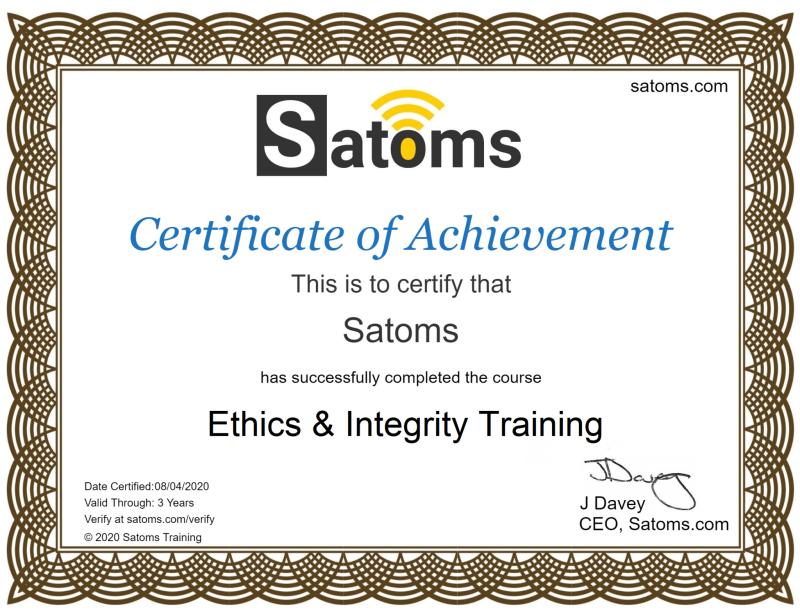What is ethethics training and certification?
Ethics training and certification involve the education and assessment of individuals on ethical principles, values, and standards of conduct within a particular profession or organization. The goal is to ensure that individuals understand and adhere to ethical guidelines, fostering a culture of integrity, responsibility, and accountability. Ethics training and certification can be relevant in various fields, including business, healthcare, law, and many others. Here's an overview of these concepts:
Ethics Training:
Purpose:
- The primary purpose of ethics training is to educate individuals about ethical principles relevant to their profession or industry.
Content:
- Topics covered may include ethical decision-making, conflicts of interest, confidentiality, fair treatment, diversity and inclusion, and compliance with laws and regulations.
Delivery Methods:
- Ethics training can be delivered through workshops, seminars, online courses, or in-person training sessions.
Audience:
- Targeted at employees, professionals, or members of a specific industry who need to understand and apply ethical principles in their work.
Frequency:
- Depending on the industry and regulatory requirements, ethics training may be a one-time requirement or an ongoing process with periodic refreshers.
Ethics Certification:
Purpose:
- Ethics certification involves a formal process by which individuals demonstrate their understanding of ethical standards and principles. Certification is often granted by professional organizations or certifying bodies.
Requirements:
- Candidates for ethics certification typically need to meet certain educational and experience requirements and pass an examination that assesses their knowledge of ethical principles.
Recognition:
- Obtaining ethics certification can enhance an individual's professional credentials and may be recognized by employers, clients, or regulatory bodies as a mark of competence and ethical understanding.
Industry-Specific:
- Ethics certification is often industry-specific, with different certifications available for various professions, such as Certified Business Ethics Professional (CBEP), Certified Healthcare Ethics Consultant (CHEC), or Certified Information Systems Security Professional (CISSP).
Maintenance:
- Some certifications require ongoing professional development and adherence to a code of ethics to maintain certification status.
Benefits of Ethics Training and Certification:
Risk Mitigation:
- Reduces the risk of ethical violations and misconduct within an organization.
Professionalism:
- Enhances the professionalism of individuals within a profession or industry.
Trust and Reputation:
- Builds trust among stakeholders and enhances the reputation of individuals and organizations.
Legal Compliance:
- Helps ensure compliance with legal and regulatory requirements.
Career Advancement:
- Individuals with ethics certifications may have improved career prospects and opportunities for advancement.
Organizational Culture:
- Contributes to the development of a positive organizational culture focused on ethical behavior.
Ethics training and certification play crucial roles in promoting ethical behavior, integrity, and responsible conduct within various sectors, ultimately contributing to the overall well-being of organizations and society.
What does ethics training and certification typically involve?
Ethics training and certification can vary depending on the specific field or profession, but generally involve the following elements:
1. Understanding Ethical Principles:
- Training typically starts with foundational knowledge of ethical principles and frameworks, such as utilitarianism, deontology, and virtue ethics.
- Participants learn to identify ethical dilemmas and challenges within their profession.
- Concepts like conflicts of interest, informed consent, whistleblowing, and professional accountability are explored.
2. Applying Ethical Decision-Making:
- Training equips individuals with tools and frameworks for making ethical decisions in complex situations.
- This often involves case studies, simulations, and role-playing exercises to apply ethical principles to practical scenarios.
- Critical thinking and analytical skills are honed to weigh consequences, consider stakeholder perspectives, and navigate gray areas.
3. Professional Codes of Conduct:
- Many professions have established codes of conduct outlining ethical standards and expected behaviors.
- Training emphasizes understanding and adhering to these codes, promoting ethical conduct within the specific field.
- Participants learn how to apply the code to real-world situations and identify potential violations.
4. Legal and Regulatory Requirements:
- Some professions face additional legal and regulatory requirements regarding ethical conduct.
- Training may inform participants about relevant laws, regulations, and compliance procedures.
- This ensures awareness of legal boundaries and potential consequences of unethical behavior.
5. Reporting and Resolution Mechanisms:
- Training often covers protocols for reporting unethical behavior or suspected misconduct.
- Participants learn how to navigate internal reporting mechanisms and whistleblower channels.
- The importance of due process and fair investigations is emphasized to ensure ethical resolution of ethical concerns.
Certification Process:
- Depending on the field, ethical training might lead to obtaining a professional certification.
- Certification typically involves completing training modules, passing exams, and demonstrating ongoing commitment to ethical conduct.
- Maintaining certification often requires continuing education or recertification processes to stay updated on evolving ethical issues and best practices.
Overall, ethics training and certification aim to equip individuals with the knowledge, skills, and resources to make ethical decisions, act with integrity, and contribute to a more ethical and responsible professional environment.
It's important to note that the specific content and focus of ethics training and certification will vary depending on the profession or industry. Always research the specific program or certification you're interested in to understand its exact content and requirements.
I hope this overview gives you a good understanding of what ethics training and certification typically involve. Let me know if you have any other questions!













